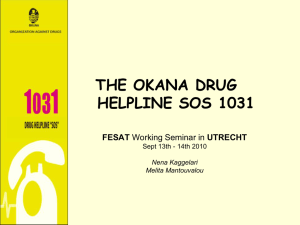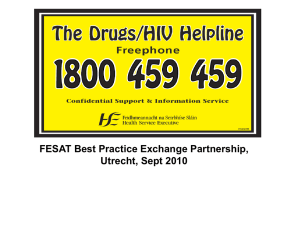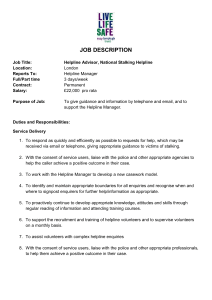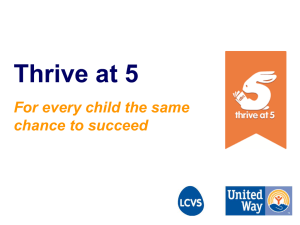proposal for a helpline for women in distress
advertisement
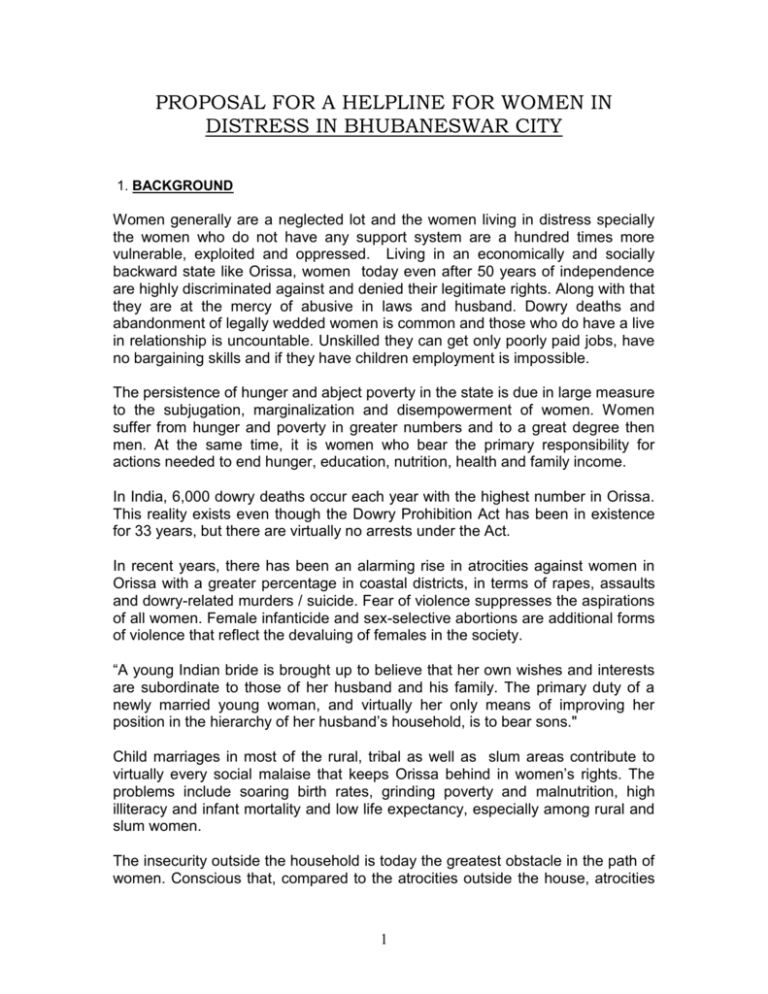
PROPOSAL FOR A HELPLINE FOR WOMEN IN DISTRESS IN BHUBANESWAR CITY 1. BACKGROUND Women generally are a neglected lot and the women living in distress specially the women who do not have any support system are a hundred times more vulnerable, exploited and oppressed. Living in an economically and socially backward state like Orissa, women today even after 50 years of independence are highly discriminated against and denied their legitimate rights. Along with that they are at the mercy of abusive in laws and husband. Dowry deaths and abandonment of legally wedded women is common and those who do have a live in relationship is uncountable. Unskilled they can get only poorly paid jobs, have no bargaining skills and if they have children employment is impossible. The persistence of hunger and abject poverty in the state is due in large measure to the subjugation, marginalization and disempowerment of women. Women suffer from hunger and poverty in greater numbers and to a great degree then men. At the same time, it is women who bear the primary responsibility for actions needed to end hunger, education, nutrition, health and family income. In India, 6,000 dowry deaths occur each year with the highest number in Orissa. This reality exists even though the Dowry Prohibition Act has been in existence for 33 years, but there are virtually no arrests under the Act. In recent years, there has been an alarming rise in atrocities against women in Orissa with a greater percentage in coastal districts, in terms of rapes, assaults and dowry-related murders / suicide. Fear of violence suppresses the aspirations of all women. Female infanticide and sex-selective abortions are additional forms of violence that reflect the devaluing of females in the society. “A young Indian bride is brought up to believe that her own wishes and interests are subordinate to those of her husband and his family. The primary duty of a newly married young woman, and virtually her only means of improving her position in the hierarchy of her husband’s household, is to bear sons." Child marriages in most of the rural, tribal as well as slum areas contribute to virtually every social malaise that keeps Orissa behind in women’s rights. The problems include soaring birth rates, grinding poverty and malnutrition, high illiteracy and infant mortality and low life expectancy, especially among rural and slum women. The insecurity outside the household is today the greatest obstacle in the path of women. Conscious that, compared to the atrocities outside the house, atrocities 1 within the house are endurable, women not only continue to accept their inferiority in the house and society as an acceptable choice. Orissa being a conservative state, the women suffer the most. Although the penalty in rape cases is severe, convictions are rare. As per the report of Women Cell Update Feb’2006 the rate of increment of crime against women was 4.1 in 1991, which increased to 10.5 in 2001. 3567 women in the state are missing in the last 6 years with the highest number of missing in Khurda District (The organization is working in this district) "Government officials even suspect that the disproportionate abortion of female foetuses may be a major underlying cause of the recent decline in the nation’s sex ratio. In 1981 there were 934 females for every 1,000 males. By 1991, the ratio dropped to 927. This sex ratio is one of the lowest in the world." Women in Orissa work longer hours and their work is more arduous than men’s. Still, men report that "women, like children, eat and do nothing." "The extent of women’s contribution is aptly highlighted by a micro study conducted in the Indian Himalayas which found that on a one-hectare farm, a pair of bullocks works 1,064 hours, a man 1,212 hours and a woman 3,485 hours in a year." In recent years, there has been an alarming rise in atrocities against women in India. Every 26 minutes a woman is molested. Every 34 minutes a rape takes place. Every 42 minutes a sexual harassment incident occurs. Every 43 minutes a woman is kidnapped. And every 93 minutes a woman is burnt to death over dowry. As per the report of Family Welfare Department, for every 7 women 2 are victims of domestic violence. The greatest tragedy facing Orissa today is the persistence of chronic violence — an intolerable phenomenon that takes the lives of thousands of women every day. Day after day, the lives of women are cut short or terribly diminished by unending, enduring crime against women. Day after day, thousands of women are denied the opportunities they need to lead healthy and productive lives. Thousands are either abandoned by the family or leave the family being agonized by the in-laws / family members. Most of them commit suicide or are raped on the street. This motivated the organization to investigate an emergency social venture to save the lives of these women in crisis and to work to ensure their legitimate right which is denied to them. The focus being the encouragement of their ability to confidently voice their grievances of violence in equalities and atrocities against them. The name of this venture is Helpline. In the wake of high incidence of crime against women and to address the problems of women Helpline was initiated as a pilot project by the Ruchika Social Service Organisation on 26th January 2004 supported by the Department of Women and Child Development, Government of Orissa. It was started as an experiment to extend a helping hand for women by setting up a round the clock telephone service with a special 2 toll free telephone number - 10920. It provides immediate and empathic response to the women in crisis in need of immediate help within Bhubaneswar City, for instance On 27th January a 12 years old girl called from Bhubaneswar railway station to inform that her mother- Nagina was seriously injured. The team member of Helpline rescued and hospitalized her. Free medication was arranged and she was cured in 2 months time. 30 year old Kuni Das was abandoned by her husband during her pregnancy. When she called she was taken to hospital in labour and was hospitalized. She delivered a baby. After 3 days she was referred to a short stay home where she is presently residing. Helpline has been assisting women like Nagina, Kuni and many others like them. In addition it offers any woman or adolescent girl who calls for a chance to talk about her feelings fearlessly, assured of complete confidentiality, without being judged or dismissed. Helpline responds to the calls immediately either by reaching the distressed woman or requesting her to reach the Helpline centre. The woman is listened to attentively and suitable assistance provided. 2. OBJECTIVES OF HELPLINE To reach out to every woman in distress and in need of care and protection by responding to emergency calls – for medical, legal advice and guidance, rescue, missing cases, shelter / short stay home, protection from abuse and exploitation, counseling, emotional support and guidance. To advocate for services for women that are inaccessible, non-existent or inadequate. To strive for excellence in quality service to women in need of special care and protection and to ensure that the best interests of the women are secured / protected. To provide a platform for net working amongst organizations and to provide linkages to support systems which facilitate the rehabilitation of women in need of care and protection. To enable them to gain confidence, self esteem and self worth. To train them in short, job oriented courses to become barefoot entrepreneurs or seek and get employment. 3. HELPLINE BELIEVES Helpline believes in the partnership approach to work. Presently it has an effective partnership with Govt. of Orissa, Indian Red Cross Society, Police, Short Stay Homes, Old age Homes, Health Care Systems, Legal Cells, Telecom Department and a number of NGOs and Net works. It is looking forward to partnership with other philanthropic 3 organizations and individuals for outreach work. This is to work together with the allied systems to create a women–friendly socity in Bhubaneswar. 4. PRESENT GEOGRAPHICAL AREA COVERED Helpline covers very specifically the Bhubaneswar Municipal Corporation area including all slums, entry points like railway stations and bus stands, resettlement colonies etc. The cases from other districts are provided tele-counseling services, guidance and referral services. 5. THE CLIENT GROUP SERVED The client group will be over 18 years of age in the following categories. Women in a) Distressed condition, abandoned and without any support system. b) On the street/pavement/railway station c) Abused. d) Missing and run away who need emergency shelter care and counseling. e) Differently abled f) Trafficked g) Commercial sex workers and those who are at risk. h) Mentally ill i) Affected by conflicts/disasters. j) Affected by HIV/AIDS / possess high-risk behaviour or stigmatized in the society for any other reason. k) Single women / widows / abandoned /aged without family support. l) Unwed mothers In addition we also help any woman in need of legal or emotional support and advice. 6. SERVICE DELIVERIES Operational strategy of the Helpline Helpline is a 24 hours telephone outreach programme for women in distress. A call coming into Helpline centre is attended to by one of the team members who work in shifts. This ensures that the calls coming in are attended to, all 24 hours at the phonereceiving centre. Depending on the nature of the call, be it by a woman or any concerned person the team member responds to it. This involves referral and networking with other organizations providing specialized services. In this process from "Response to Rehabilitation" the woman’s participation is an integral component. The services that will be delivered, both institutional and non-institutional and the charges, if any that will be realized from the beneficiary. There are: 4 a) Medical Assistance Short term medical assistance will be provided depending on the case. Long term may be considered for special cases. b) Legal Assistance Legal advice will be provided to all the women in need by practicing advocates. Legal fee will be provided to those who are single / on the street / abandoned / having no means to meet the legal expenses. c) Short Stay Home Short stay home facilities for a maximum period of 3 months will be provided by the organisation to women without a home / abandoned / mentally ill / run away. In the mean time her family will be identified, contacted and she will be repatriated. Homeless women will be provided with government run short stay homes for a period of 3 years, vocational training and rehabilitation services . Swadhar homes run by other NGOs will also be contacted for the purpose. f) Rescue Women in any abusive condition or threatened will be rescued immediately. She will then be either repatriated or referred to an NGO for short stay home services. g) Missing Women Attempt will be made to locate missing women with the help of police or the networking system of the organization. If located she will be repatriated / helped with short stay home facilities. h) Emotional Support and Guidance Emotional support and guidance will be provided to all the women who call for help. They may be counseled on telephone or in person. Wherever possible the women will be called to the Helpline Office for counseling. If not the counselor will visit the women and counsel her. The women under intervention for medical, legal, missing, rescue, will be regularly counseled and emotional support will be provided to them till they have recovered from the psychological trauma i) Referral Referral service will be provided to all the women who desire assistance from Helpline. The women from other cities, districts will also be provided referral services. They will be informed about the different services available at the Govt. / private agencies in their area. 7. TELEPHONE CALLS 5 Helpline will receive all kinds of calls. These can be broadly classified as follows : Intervention /Assistance Calls These calls require Helpline to actively respond and follow up. They can be sub divided into: 1. Medical Assistance 2. Shelter / Short Stay Home 3. Repatriation Assistance 4. Abuse / Rescue 5. Missing 6. Legal Assistance 7. Emotional Support and Guidance 8. Referral to Services Every call is important. Every woman / caller dialing 10920 wants to say something and would like Helpline to do something concrete. Helpline in turn needs to respect that trust by effectively responding to the calls. 8. BASIC INTERVENTION STEPS OF HELPLINE a) Creating Awareness Helpline awareness will be generated among the women, the allied system, the general public as well. The aim of creating awareness about Helpline is to ensure that the services for protection of women is accessible across the city. Following strategies would be followed for awareness - Awareness in slums thorough individual discussions, community meetings, posters, stickers etc. Distribution of leaflets, pasting of poster, sticker in the exhibitions and public places. Awareness through press and electronic media Film slides Street plays , puppet shows and other folk media Seminars, workshops and meetings Women to women, teacher to community, community to community, child to community approach will be followed in order to spread the awareness in public. Awareness building on the following will be planned. - Women would be given first priority - Helpline is a service primarily for the women in crisis and in need of care and protection. - Every woman has right to protection and it is the collective responsibility of civil society to provide the woman with an enabling environment. - A woman is not an object of pity. Services should be provided to her on a rights based approach. 6 - Today’s adolescent girl is tomorrow’s woman. So adolescent girls should be treated with care. b) Allied System The non-hierarchical structure formation at the city level also focuses on utilizing existing resources and not creating any additional infrastructure. Some of these representatives will allocate time, attention, money, infrastructure etc. An attitudinal change from seeing the woman in need of care as a problem, to seeing her as a failure on the part of the system. 9. STAFFING PATTERN The project will operated by two groups of workers. One group will be engaged in rescue operations and rehabilitation (Helpline staff) and the second group will look after them while they are in the shelter (Shelter staff). The role and responsibility of these staff members will be as follows : Sl Designation Helpline Staff Project Coordinator No Qualification Role and Responsibility 01 Post Graduation in any Sociology / Social Work with experience Counselor (Female) 01 Team Member (for shift wise duty) 07 Post Graduation in Psychology/ Sociology/ Social Work Under Graduate Coordinate the project, liaison, supervision, planning, implementing, monitoring and periodical evaluation. He/She will also be responsible for training the staff, reporting and documentation. Counsel the new cases and the inmates of the short stay home. She also will visit the field and counsel the women in need of care and protection. Attend the telephone call, rescue, provide support services like medical, shelter, rehabilitation, repartiation etc. Link them to other support services e.g. other short stay homes, legal services etc. Outreach, meetings, open houses, contact telephone booths, community and members of allied system individually. Legal advise to the women in Volunteer (Part 02 time) High School Certificate Legal Adviser Law Graduate 01 7 (Part time) with Bar experience need. Filing cases in the court if necessary. Linking them to government legal services for free legal aid. Duty at night for emergency rescue operations 01 Graduation Asst. Shelter in 01 Charge (Female) Cook 01 Graduation Coordinate for providing different services like food, medical help, clothes, and other needy services. Linking them to vocational training and rehabilitation. Assist the shelter in charge in her work. Watchman Under Matric Driver (Part time) Shelter Staff Shelter in Charge (Female) 01 01 Under Matric Cooking, purchasing and distribution of the food Guard at night 10. APEX COMMITTEE The Apex Committee is the principal policy – making body of Helpline at the city and is responsible for ensuring the effective functioning of Helpline. It will be formed with the collaboration of Govt. of Orissa. Director, Women and Child Development Department will be selected as the Chairperson of the Committee. Among others, Red Cross Society of India, C.M.O of Capital Hospital, and other leading NGOs and philanthropic individuals will be selected as members. The members will meet once a quarter and discuss different issues of Helpline, review its work, liaison with allied system of the state (the Departments / agencies which are concerned with women issues), prepare plan of action for the future, discuss and find possible solution of the problems, and carry out all possible activities of the programme. 11. THE PHYSICAL TARGETS Helpline seeks to achieve the following targets in the city by the end of every year Attend to approximately 6,000 calls by the end of the year Intervene in 400 cases who need the Helpline's help with medical, legal advice, shelter, rescue, missing, repatriation, emotional support and guidance. Create a women friendly Allied System in the city. Sensitize all the Allied Systems, and general people of the city through different media/strategies. Establish a linkage in the Allied Systems for long term rehabilitation of every woman in distress in the city. Sensitize all people of slums of Bhubaneswar on Helpline to cater to the needs of all slum distressed women. 8 Ensure rights of women in the city. 12. MONITORING AND EVALUATION The activities of the Helpline and Shelter will be directly monitored by the Project Coordinator. He will prepare an annual, quarterly and monthly activity plan for the project in consultation with other staff members. He will see that the activities are done on time. He will also coordinate with the Project Manager in Charge of this project and the Director and take joint decision with them. He will prepare quarterly progress report and will present that before the Apex Committee. Apex committee will review the work of Helpline on a quarterly basis and give expert suggestions on different matters. The activities of the project will be evaluated jointly in a participatory approach every year. The Project Coordinator, Project Manager, one of the Apex Committee members and Director will apprise the performance of the staff members and evaluate the program. They will also suggest necessary the recommendations for the improvement of quality. The evaluation report will be sent to the funding agency with the Annual Report of the project. 13. BUDGET Sl Budget Head Salaries Project Coordinator - 1 Counselor - 1 Team Members - 7 Volunteer - 2 Legal Advisor Driver Shelter In Charge Asst. Shelter in Charge Cook Watchman Sub Total Programs Telephone & Communication Meetings and Outreach & IEC materials Rescue/ Repatriation Printing & Stationery Staff Travel Vocational Training & Calculation Amount @ 5500/- p.m. X 12 @ 3000/- p.m. X 12 @ 2000/- p.m. X 7 X 12 @ 1000/- p.m. X 2 X 12 @ 1500/- p.m. X 12 @ 1000/- p.m. X 12 @ 2500/- p.m. X 12 @ 1500 /- p.m. X 12 @ 2000/- p.m. X 12 @ 2000/- p.m. X 12 66,000/36,000/1,68,000/24,000/18,000/12,000/30,000/18,000/24,000/24,000/4,20,000/- @ 2000/- p.m. X 12 24,000/- @ 1000/- p.m. X 12 12,000/- @ 1500/- p.m. X 12 @ 1500/- p.m. X 12 @ 1000/- p.m. X 12 @ 1000/- p.m. X 12 18,000/18,000/12,000/12,000/- 9 Rehabilitation kit Food for 20 internees Clothes for 20 internees Medication & Health care for 20 internees and other women in need of medical help Hygiene & Cleaning for 20 internees Welfare of internees House Rent, Electricity/Water Sub TOTAL GRAND TOTAL @ 20/- X 20 X 30 X 12 @ 200/- X 20 @ 4000X 12 1,44,000/4,000/48,000/- @ 30/- X 20 X 12 7,200/- @ 500/- X 12 @ 4000/- X 12 6,000/48,000/- APPROXIMATELY US DOLLAR @ Rs. 43/- 3,53,200 7,73,200 7,73,000/$ 17,657/- 14. THE IMPERATIVE Indian constitution has given equal right to both men and women, to check the exploitation against women. Stringent laws have been enacted as regards marriage, divorce and succession, dowry prohibition Act etc. The call for the 21st century should be to develop consciousness among women of their rights and duties. Women should be made self-reliant. All these will be possible through a social revolution. Women must raise their voices with full force against exploitation, torture and social discrimination. They can no more be treated as 2nd class citizens. If this is not done gender justice will be a myth. Beijing conference of 1995, had adopted a platform and set out an agenda for advancement of women at the national and international level to remove gender discrimination. The twin goals of female empowerment and male enlightenment can make gender justice a reality. In case of self protection we always remember the advise of Mahatma Gandhi " when a woman is assaulted she may not stop to think in term of himsa or Ahimsa. Her primary duty is self-protection. She is at liberty to employ every method means that come to her ear or mind in order to defend her honour. God has given her nails and teeth. She must use them with all her strength and if need be die in the effort". ******* 10
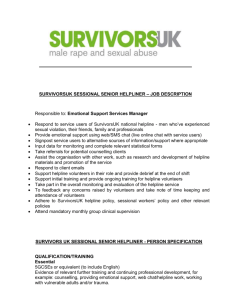
![Extreme Weather Conditions - Preventative Measures [doc / 272KB]](http://s3.studylib.net/store/data/007256003_1-f08a5267d9e865d85ddea6fe14d19a26-300x300.png)
